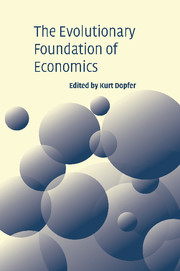Book contents
- Frontmatter
- Contents
- List of contributors
- List of figures
- List of tables
- Prolegomenon
- I Ontological foundations
- 2 The rediscovery of value and the opening of economics
- 3 Synergetics: from physics to economics
- 4 Darwinism, altruism and economics
- 5 Decomposition and growth: biological metaphors in economics from the 1880s to the 1980s
- 6 Path dependence in economic processes: implications for policy analysis in dynamical system contexts
- 7 Is there a theory of economic history?
- II A framework for evolutionary analysis
- Index of topics
- Index of names
- References
7 - Is there a theory of economic history?
Published online by Cambridge University Press: 22 September 2009
- Frontmatter
- Contents
- List of contributors
- List of figures
- List of tables
- Prolegomenon
- I Ontological foundations
- 2 The rediscovery of value and the opening of economics
- 3 Synergetics: from physics to economics
- 4 Darwinism, altruism and economics
- 5 Decomposition and growth: biological metaphors in economics from the 1880s to the 1980s
- 6 Path dependence in economic processes: implications for policy analysis in dynamical system contexts
- 7 Is there a theory of economic history?
- II A framework for evolutionary analysis
- Index of topics
- Index of names
- References
Summary
Theory and history
Is there a theory of economic history? More than thirty years ago this question was posed in John Hicks’ Theory of Economic History (1969). Hicks noted that very few scholars have even ventured to answer the question. Looking at those who have since the heady days of Karl Marx and Oswald Spengler, we get an idea why. It is, quite simply, hard to do, and Hicks, who was widely read in general history (to say nothing of economic theory), paid little heed to what was already at that time a huge body of literature in economic history. He could not be bothered with details, because he was interested exclusively in general tendencies, trends and moments. A few observations that did not lie on his curve did not bother him, he said, because he was not dealing with ‘theory’ as it would be understood in our time: tight logical propositions formulated as theorems, which are refuted by a single counter-example. That kind of theory did not and will not exist in economic history. But Hicks was looking elsewhere.
What Hicks meant by a theory of economic history is something close to what Marx meant: namely to take from economics some general ideas, which he then applied to history so that the pattern he saw in history had some extra-historical support. A rereading of his book suggests that he was – at best – only partially successful in this undertaking.
- Type
- Chapter
- Information
- The Evolutionary Foundations of Economics , pp. 195 - 218Publisher: Cambridge University PressPrint publication year: 2005
References
- 1
- Cited by



